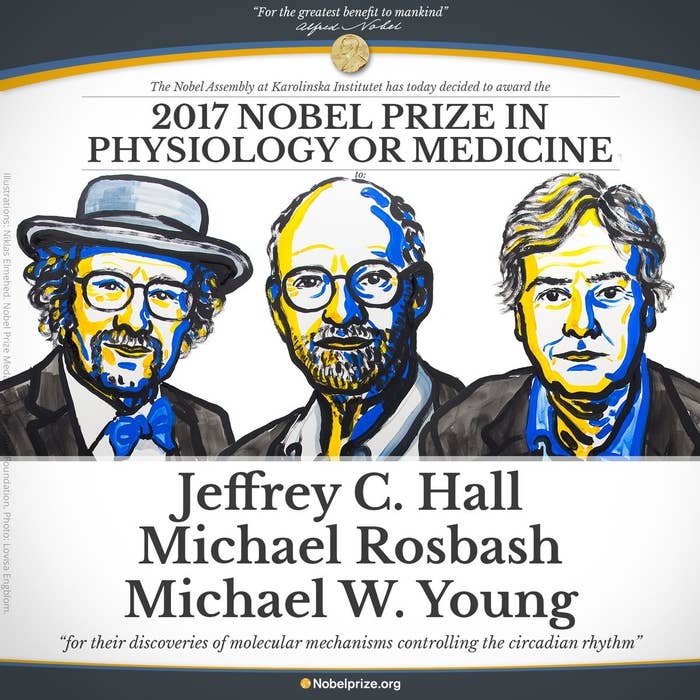
The 2017 Nobel Prize in Physiology or Medicine has gone to three US scientists for their work on how our bodies' internal "clocks" are run by the chemistry in our cells.
The work has helped explain why things like jet lag happen, and why shift work that keeps people awake at unusual times of the day is bad for health.
Jeffrey C Hall, Michael W Young, and Michael Rosbash discovered a gene in fruit flies that controls a protein that builds up in cells over the course of a night and dissipates in the day. This gene, along with others the scientists discovered, appears to control how our cells respond to the changing time of day.
Our biological clock helps to regulate sleep patterns, feeding behavior, hormone release and blood pressure… https://t.co/A7Lo00k3pG
The new Nobel laureates have raised awareness of "the importance of a proper sleep hygiene” said Juleen Zierath of the Nobel academy.
By the time of the announcement Hall and Rosbash had been reached by phone, but Young had not yet been told of his win. “Rosbash was at first silent and then said ‘You are kidding me,’” a spokesperson for the Nobel committee said.
Russell Foster, a professor of circadian neuroscience at the University of Oxford, told BuzzFeed News that he was "absolutely delighted" that the three had won. "Many people have made immense contributions to this field," he said. "But this is an absolutely fair and just award." He said that the trio's work was "pioneering".
In 1984, Rosbash and Hall, working at Brandeis University in Boston, and Young at Rockefeller University in New York isolated a gene they called "period", which controlled the expression of a protein called PER. They saw that PER builds up during the hours of night, and dissipates again in daytime, so the levels oscillated over a 24-hour cycle, the basis of the "circadian rhythm" or body clock.
Importantly, they also discovered that when PER builds up in the cell, it turns off "period". So it is a self-regulating mechanism. "That was the key fundamental breakthrough," said Russell. "The appreciation of a molecular feedback loop – a gene encodes a protein which feeds back and inhibits the gene's own expression."
It wasn't clear how PER could influence its own expression, since it was unable to bind to DNA. But in 1994, Young also discovered another gene-protein pair, "timeless" and TIM, which was the missing link. He also found a third, "doubletime" and DBT, which helped control the 24-hour period.
Later research found that these genes had equivalents in every other animal, including mice and humans. But it was Young, Rosbash, and Hall's work in fruit flies that paved the way, said Foster. "I'm a vertebrate circadian biologist myself," he said. "But the drosophila [fruit flies] people should have the Nobel prize, because drosophila genetics was way ahead of vertebrate genetics. They started to put together the story of a molecular feedback loop, and that's the model that all the other clocks are based on."
He said that the research has had an "immense" impact, in showing how genes don't just control what our bodies look like, but also affect our personalities, actions, and behaviour. "If you want to understand how genes ultimately give rise to behaviour, this is the best example we have." Things like whether you're a "morning" or an "evening" person – "whether you're a lark or an owl," he said, "are to some extent, not completely, but to some extent driven by how these genes."
It's also, he said, raised the profile of the whole field. "There's been this extraordinary explosion of information," he said. "People thought, there's this clock, and it's ticking – why is it important? Why do we generate this internal day that influences all this behaviour? So now there's all this work on jet lag and shift work, and why sleep and circadian rhythms are so important to teenagers, and it's all been built on top of this."
Foster's own work, on how light helps regulate the expression of the genes to keep the 24-hour cycle exact, draws heavily on the discoveries of Young, Rosbash, and Hall. He said that his lab is working on drugs that could help mimic the effects of the clock, to help people in whom the clock is malfunctioning.

